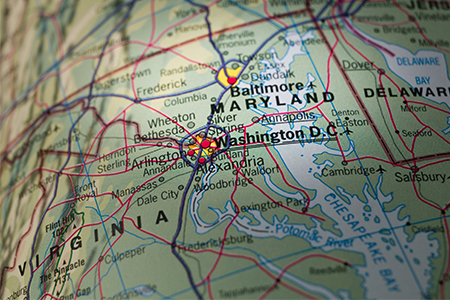You May Also Like
MARYLAND CPA EXAM & LICENSE REQUIREMENTS 2024
What follows is a primer on how to become a CPA in Maryland.

There are many ways to practice accountancy. You can be an internal auditor for a company or you might work as a forensic accountant for a law firm or in the law enforcement system. There are accountants who specialize in fraud and others that work in information systems. However, the very top of the profession has always been the Certified Public Accountant (CPA). This state-licensed credential is highly respected throughout the business and finance worlds. To become a CPA, you must satisfy your state’s requirements. What follows is a primer on how to become a CPA in Maryland.
General Requirements
Maryland’s requirements for potential CPAs are not unlike many other states. They have specific education requirements, CPA examination criteria, an Ethics exam and standards for pre-licensure experience. Maryland’s Board of Public Accountancy requires that you must be at least 18 to become a CPA and have a valid Social Security number. However you needn’t be a state resident or a U.S. citizen. For their education requirements, you’ll need 120 hours and a bachelor’s degree, but you’ll need a full 150 semester hours of academic work to qualify for the state license.
Educational Standards
Maryland does have very specific requirements for coursework. If you are attending college in the state, your advisor will likely be up to date on the courses required. However, if you are studying in another state but wish to practice accountancy in Maryland, make sure that you and your advisor plan your education to adhere to their most current standards. The state breaks its requirements into two general groups and has specific needs in both. The courses you need are as follows:
Group One: Accounting and Ethics, 30 hours:
- Three hours Cost Accounting
- Three hours Auditing
- Three hours Taxation
- Three hours Business or other Ethics course
- Nine hours Financial Accounting
- Nine hours Accounting electives
Group Two: Business-Related Coursework, 21 hours from any or all of the following:
- Computer Science
- Quantitative Methods
- Business Communication
- Business Law
- Marketing
- Management
- Corporate Finance
- Economics
- Statistics
Before you go any further in your education, ensure that your college or university credits will be recognized by Maryland. Your institution must be accredited by one of the following agencies:
- Association to Advance Collegiate Schools of Business
- Accreditation Council for Business Schools and Programs
- Middle States Association of Colleges and Schools
If it is not, discuss this issue with your advisor. Then, ask the Maryland Board to evaluate your program to see if it qualifies. Note that your college’s accreditation may well be acceptable by many states, including Maryland, yet not meet their preferred requirements.
Since the state requires a full 150 hours for the license, but only 120 hours to sit for the CPA exam, you might consider doing graduate-level work to fulfill those extra hours. Then, once you have your full license, you will be all the more desirable than a job applicant with only undergrad credits. Another option is to seek for-credit internships that will give you real-world experience and show a dedication to the profession.
CPA Examination
Once you have completed the education requirements, have your official transcripts sent to the Division of Occupational and Professional Licensing. Make sure that you send transcripts from every institution of higher learning you took for-credit classes with. Even if that single summer course transferred to your graduating alma mater, you will need to have that school provide official transcripts in a sealed envelope to the Professional Licensing office.
With the education requirements behind you, you can move on to the Uniform CPA Examination, a rigorous 4-part exam designed by the American Institute for Certified Public Accountants (AICPA). Once your application to sit for the exam has been accepted, you will receive a Notice to Schedule, whereupon you’ll need to schedule and sit for at least one part of the exam within six months or else you will need to pay another fee, reapply, and reschedule.
Candidates often need to retake some or all of the test modules. Try to be as prepared as possible. The four parts of the examination are as follows:
- Financial Accounting and Reporting (FAR)–This covers financial reporting frameworks from several industry experts. Candidates are asked to compare statements that reflect different reporting standards.
- Auditing and Attestation (AUD) –This section tests your knowledge of the International Standards of Auditing as well as U.S. standards.
- Regulation (REG)–Ethics and your professional and legal responsibilities are covered in this test.
- Business Environment and Concepts (BEC)–This section covers general business concepts and international business. You’ll need good written skills to successfully complete this part.
Ethics Exam
When you have passed the CPA exam, you have one more AICPA test to pass: the Ethics Exam. This test is not terribly difficult but it must be passed with a score of 90 or more. You can order a CD-ROM with self-study materials for an 11-hour course. Once you have studied the course, the test will be open-book.
Experience
Finally, Maryland requires 2,000 hours of logged hours of practical accounting experience. You must have all work approved and endorsed in writing by an actively licensed CPA. You will need to demonstrate professional aptitude including clear communication, critical thinking, problem solving and technological acumen. Your supervising CPA will submit a Report of Practical Work Experience to the Board.
Once your application is complete and approved, Maryland will award you a full CPA license.
For the latest updates on licensure requirements, including renewals and reciprocity, please visit the state’s website: Maryland Board of Public Accountancy.